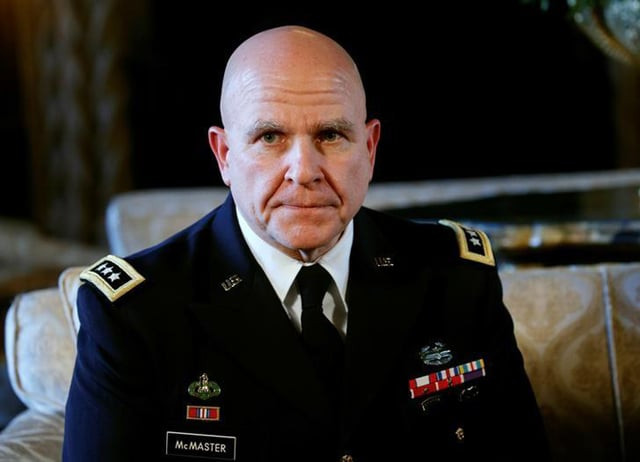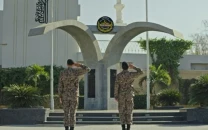Trump's national security adviser on unannounced visit to Pakistan
US National Security Adviser holds official talks with PM Nawaz, Sartaj Aziz

National Security Adviser H R McMaster. PHOTO: REUTERS
It was the first visit by a top member of President Donald Trump's administration to the militancy-hit South Asian country, and came after a stop in neighbouring Afghanistan where he suggested Washington may take a stronger line on Islamabad, for years seen as an unreliable US ally.
A statement issued by Prime Minister Nawaz Sharif's office said McMaster had "assured the Prime Minister that the new administration was committed to strengthening bilateral relations and working with Pakistan, to achieve peace and stability in Afghanistan and in the wider South Asian region." McMaster's visits are being closely watched for clues as to the Trump administration's future course of action in the region.
Nawaz reaffirmed his commitment to a peaceful neighbourhood and apprised the US NSA of the steps taken by Islamabad to reach out to both New Delhi and Kabul. The prime minister also conveyed Pakistan’s readiness to work with the international community to explore ways in which Afghan crisis can be resolved.
Pakistan will not transfer weapons of mass destruction to state or non-state actors: Aziz
Regarding ties with India, PM Nawaz reiterated his firm conviction on sustained dialogue and meaningful engagement as the only way forward to resolve all outstanding issues between the nuclear-armed neighbours including the Kashmir dispute.
The prime minister also welcomed President Trump's willingness to help India and Pakistan resolve their differences particularly on Kashmir.
The US NSA also met with PM's senior aide Sartaj Aziz. Aziz welcomed the US delegation and noted that Pakistan and the US have been close friends over decades and that a continued strong partnership between the two countries remained critical to promoting and sustaining peace and stability in the wider region.
He gave a detailed briefing on the policies being pursued by the government that have resulted in improved security environment and economic turnaround in Pakistan. On terrorism, Aziz noted that impressive gains have been made in eliminating terrorists. He further said Pakistan remained determined to continue this fight as part of the National Action Plan until terrorism is completely eliminated from the country.
He said that the government was determined to maintain the existing momentum on both security and economic fronts to lead the people of Pakistan towards a prosperous and secure future.
US confident of Pakistan’s ability to safeguard nuclear weapons
Conveying Pakistan’s concerns over the deteriorating security situation in Afghanistan, Aziz reaffirmed Pakistan’s commitment to working with the international community to support efforts for peace and reconciliation in Afghanistan. He also highlighted the importance of effective border management as part of the actions required to achieve sustainable peace in the region.
In reiterating Prime Minister Nawaz Sharif’s vision of a peaceful neighbourhood and commitment to dialogue and engagement, Aziz informed the visiting delegation of the steps taken by Pakistan to reach out to both India and Afghanistan.
Aziz was assisted by the Special Assistant to the Prime Minister on Foreign Affairs Syed Tariq Fatemi, National Security Adviser Lt-Gen (retd) Nasser Khan Janjua and senior officials of the Ministry of Foreign Affairs. General McMaster was assisted in the meeting by David Hale, US Ambassador, Laurel Miller, Acting US Special Representative for Afghanistan and Pakistan, Senior Director for South Asia Lisa Curtis and Director Pakistan Jay Wise in the National Security Council.
General McMaster thanked Aziz and acknowledged Pakistan’s sacrifices in combating extremism and terrorism. He renewed the commitment of the new administration to work closely with Pakistan in strengthening mutually beneficial relations and towards the shared objectives of peace and stability in Afghanistan and the region.
Speaking to Afghanistan's Tolo News on Sunday, McMaster had said "as all of us have hoped for many many years, we have hoped that Pakistani leaders will understand that it is in their interest to go after these groups less selectively than they have in the past and the best way to pursue their interest in Afghanistan and elsewhere is through diplomacy not through the use of proxies that engage in violence."



















COMMENTS
Comments are moderated and generally will be posted if they are on-topic and not abusive.
For more information, please see our Comments FAQ